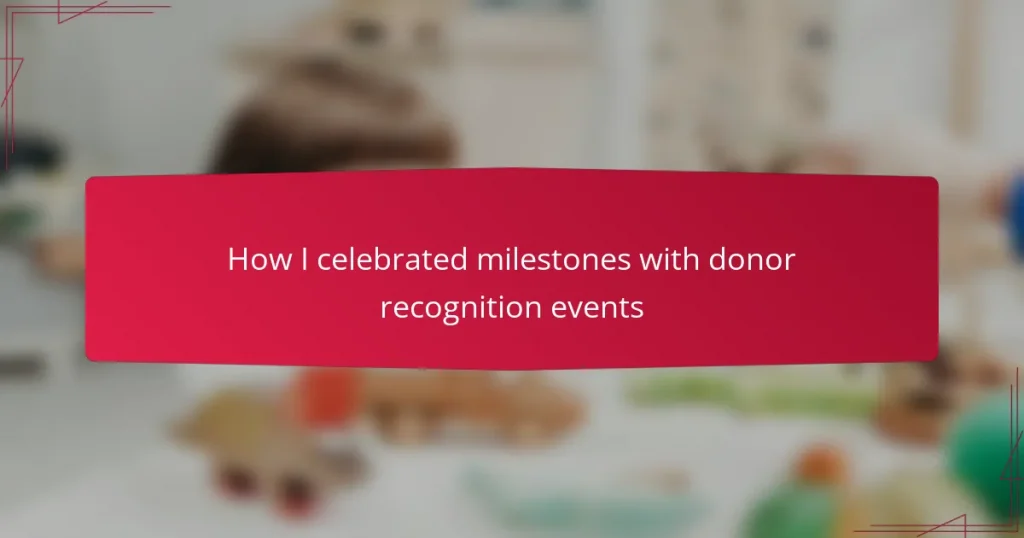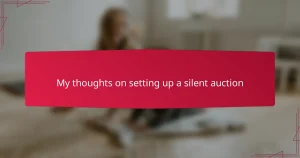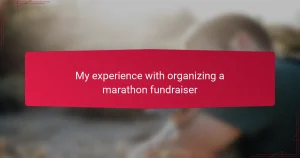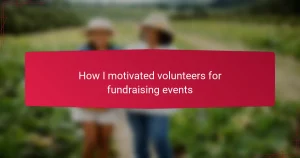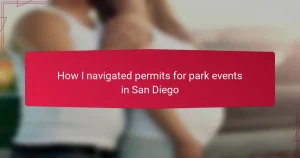Key takeaways
- Donor recognition events strengthen donor connections and inspire ongoing support by celebrating contributions and milestones.
- Incorporating personal stories and interactive elements in event planning enhances emotional engagement and fosters a sense of community.
- Measuring the impact of recognition events includes both quantitative data (donor retention) and qualitative feedback (donor sentiments and experiences).
- Creating meaningful experiences tailored to local culture can make donors feel valued and enhance their commitment to the cause.

Understanding Donor Recognition Events
Donor recognition events play a vital role in celebrating milestones by showing appreciation to supporters. From my experience, these gatherings not only honor generosity but also deepen the connection between donors and the cause. They create moments filled with gratitude and motivation, which fuel future fundraising efforts.
| Aspect | Donor Recognition Events |
|---|---|
| Purpose | To thank and celebrate donors for their support and milestones achieved |
| Emotional Impact | Creates a sense of accomplishment, gratitude, and belonging |
| Typical Format | Ceremonies, receptions, or informal meetups acknowledging donor contributions |
| Connection to Cause | Strengthens personal ties between donors and fundraising goals |
| Outcome | Increases donor retention and encourages ongoing support |

Importance of Milestones in Fundraising
Milestones in fundraising aren’t just numbers—they are moments that reflect dedication, growth, and community impact. I’ve found that celebrating these milestones with donor recognition events not only honors contributions but also strengthens the bond between supporters and the cause. These celebrations serve as powerful reminders of progress, inspiring continued generosity and engagement.
| Without Milestone Celebrations | With Milestone Celebrations |
|---|---|
| Donor contributions may feel transactional and less personal. | Donors feel appreciated and emotionally connected to the cause. |
| Harder to track and showcase growth and impact clearly. | Milestones visibly demonstrate progress and motivate further support. |
| Community involvement can wane without recognition moments. | Events create opportunities for community gathering and shared enthusiasm. |

Planning Successful Recognition Events
Planning a successful donor recognition event takes thoughtful coordination and genuine attention to what makes donors feel appreciated. From my experience organizing events for San Diego family fundraising efforts, I’ve found that tailoring the event to highlight personal stories and shared goals creates a warm and memorable atmosphere. It’s not just about handing out awards; it’s about connecting donors to the real impact of their generosity.
One detail that made a big difference for me was gathering testimonials from families who benefited from the fundraising. Sharing these during the event sparked emotional moments that resonated deeply with attendees. If you want your recognition event to leave a lasting impression, consider these key elements:
- Choose a meaningful venue that reflects your cause and feels welcoming
- Personalize invitations to make donors feel uniquely valued
- Incorporate stories and visuals that show the difference donations make
- Plan interactive moments, like photo booths or thank-you stations, to engage guests
- Recognize donors not just by amount, but by their unique commitment and impact
- Provide opportunities for donors to connect with beneficiaries or project leaders
- Follow up with personalized thank-you notes after the event to maintain relationships
By focusing on these details, your event will feel less like a formal ceremony and more like a heartfelt celebration of community and support.

Engaging Donors in San Diego Communities
Engaging donors in San Diego communities means more than just hosting an event; it’s about creating meaningful experiences that resonate with their values and passions. From my experience, the most impactful recognition events are those that tap into the unique culture and spirit of San Diego, making every donor feel like they are truly part of something bigger.
One time, we organized a seaside gathering that featured local artists and storytellers, which not only highlighted our mission but also celebrated the community we serve. The joy and pride on donors’ faces reminded me why these events matter so much—they build connections that last beyond a single celebration.
- Tailor events to reflect local culture and community interests
- Include personal stories that illustrate donor impact
- Offer opportunities for donors to engage directly with beneficiaries
- Highlight milestones with visual displays or interactive exhibits
- Foster informal settings to encourage genuine conversations
- Use local talents and venues to create a warm, familiar atmosphere

Personal Stories of Celebrating Milestones
One of the most memorable moments I experienced was during a milestone celebration where a donor, quietly moved, shared how our event rekindled her passion for community giving. It made me realize how these recognition events do more than mark numbers—they touch hearts and renew commitments. Have you ever seen someone’s eyes light up because they felt truly seen and appreciated? That’s the kind of impact these personal stories bring to life.
There was another time when a young family came forward to tell their story of how the fundraising milestone directly contributed to their child’s therapy. Hearing their heartfelt thanks in front of everyone shifted the event from a routine ceremony to an unforgettable affirmation of purpose. These stories transform milestones into living proof of hope and change, and in my experience, that’s what really sticks with donors long after the event ends.
I often wonder why we don’t hear more personal stories during milestone celebrations, because when we do, the connection deepens instantly. Sharing these moments reminds me that every donor’s support carries a name, a face, and a story—and recognizing that makes celebrating milestones feel like a genuine, heartfelt conversation rather than just an event on a calendar.

Tips for Hosting Memorable Events
When I plan donor recognition events, one tip I always keep in mind is to make every guest feel personally valued. It’s amazing how a simple, heartfelt welcome or a handwritten note before the event can set the tone for genuine connection. Have you ever noticed how small gestures make a big difference in making people feel seen and appreciated?
Another strategy I swear by is incorporating interactive elements that invite donors to engage beyond just listening. For example, inviting them to write down their hopes for the cause or share brief stories creates moments of reflection and connection. These experiences turn routine events into memorable celebrations that linger long after the last toast.
Lastly, I’ve learned that timing and pacing matter more than we often expect. Rushing through acknowledgments or cramming too much in the program can dilute the emotional impact. Instead, allowing space for pauses, personal stories, and organic conversations creates a warm, inviting atmosphere that truly honors the milestone—and the donors who made it possible.

Measuring Impact of Recognition Events
Measuring the impact of donor recognition events has always intrigued me because the true value goes beyond simple attendance numbers. After hosting several events, I found that tracking donor retention and subsequent contributions offers concrete evidence of how these celebrations deepen commitment. Do donors come back more often? In my experience, yes—and that’s a powerful sign that they feel genuinely appreciated.
But how do you quantify something as emotional as gratitude? I’ve learned that gathering feedback through surveys or informal conversations right after the event brings invaluable insights. Hearing donors express renewed enthusiasm or sharing stories about why they continue to give makes the impact real and personal. Those moments of heartfelt connection reveal more than any statistic ever could.
One unforgettable instance was following a recognition event where a longtime supporter told me, “This celebration made me realize my gift truly matters.” These words confirmed what I suspected all along: recognition events aren’t just ceremonies; they’re catalysts for lasting relationships. That’s why measuring impact means looking both at hard data and those soft, meaningful moments that keep donors engaged for the long haul.
